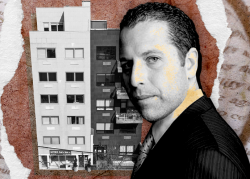A nearly completed South Williamsburg residential building could be taken over by its lender next month.
As UCC foreclosures rise in the city, New York-based DW Partners has scheduled one Dec. 13 for equity interests in 427 Marcy Avenue. The lender is able to foreclose because it provided three loans on the project totaling $25 million in 2019.
The project, now known as just 427 Marcy Avenue, is being developed by Ezra Unger of Brooklyn. He initially filed plans to build a seven-story, 19-unit mixed-use project at 415 Marcy Avenue in December 2015. The developer also filed plans for a six-story, 33-unit mixed-use project at the adjacent parcel of 419 Marcy Avenue. Diego Aguilera Architects was the architect of record.
The site at 415 Marcy Avenue became known as 427 sometime in the past four years, according to Department of Building records. Under the latter address, plans were filed recently with the state attorney general to build 25 condo units with a $42.8 million projected sellout.
Read more


Unger, who heads JNY Capital, has faced lawsuits from lenders and investors in the past. In June, an investor alleged it provided Unger with $4.2 million for a project that was not completed by its April 14 deadline. The suit also accused Unger and his companies of saddling the project with large loans, diluting much of the equity in the property.
Matthew Mannion of his eponymous firm is preparing to hold the December auction. Brock Cannon of Newmark is spearheading the marketing of the equity interests.
Commercial foreclosures are still banned under New York state law so lenders have turned to UCC foreclosures, which are legal because the lender takes control of equity interests in a property, not the property itself. The outcome of such an action, though, is essentially the same: Control of the property changes hands.
As part of the UCC sale process, the lender must set an auction date at which third parties can bid. But generally, the lender is able to make a “credit bid,” that is, use its existing debt to make an offer.
